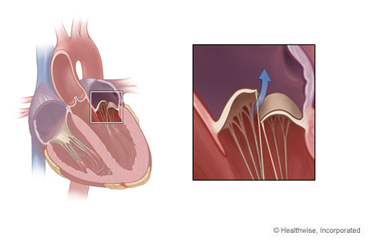
Overview
The mitral valve lets blood flow from the upper to the lower heart chamber on the left side of the heart. Mitral valve regurgitation occurs when the valve can't close all the way and blood backs up into the upper chamber of the heart. This causes the heart to work harder to pump the extra blood.
You may have this condition for many years without having problems. But over time, it can weaken the heart and lead to heart failure.
This condition can be caused by many things, including mitral valve prolapse, calcium buildup on the valve, coronary artery disease, and heart failure.
Your doctor will check your heart regularly. Your doctor will likely recommend a heart-healthy lifestyle. You may take medicine to treat a problem that is causing, or was caused by, the regurgitation. If the disease becomes severe, you may choose to have the valve repaired or replaced.
Follow-up care is a key part of your treatment and safety. Be sure to make and go to all appointments, and call your doctor if you are having problems. It's also a good idea to know your test results and keep a list of the medicines you take.
How can you care for yourself at home?
- Be safe with medicines. Take your medicines exactly as prescribed. Call your doctor if you think you are having a problem with your medicine. You will get more details on the specific medicines your doctor prescribes.
- Call your doctor if you have new symptoms or your symptoms get worse.
- Eat heart-healthy foods. These include vegetables, fruits, nuts, beans, lean meat, fish, and whole grains. Limit sodium, sugar, and alcohol.
- Be active. Ask your doctor what type and level of exercise is safe for you. Let your doctor know if your ability to exercise changes.
- Do not smoke. If you need help quitting, talk to your doctor about stop-smoking programs and medicines. These can increase your chances of quitting for good.
- Stay at a healthy weight. Lose weight if you need to.
- Manage other health problems. If you think you may have a problem with alcohol or drug use, talk to your doctor.
- Avoid infections such as COVID-19, colds, and the flu. Get the flu vaccine every year. Get a pneumococcal vaccine. If you have had one before, ask your doctor whether you need another dose. Stay up to date on your COVID-19 vaccines.
- Take care of your teeth and gums. Get regular dental checkups. Good dental health is important because bacteria can spread from infected teeth and gums to the heart valves.
When should you call for help?
Call 911 anytime you think you may need emergency care. For example, call if:
- You have severe trouble breathing.
- You cough up pink, foamy mucus.
- You have symptoms of a heart attack. These may include:
- Chest pain or pressure, or a strange feeling in the chest.
- Sweating.
- Shortness of breath.
- Nausea or vomiting.
- Pain, pressure, or a strange feeling in the back, neck, jaw, or upper belly or in one or both shoulders or arms.
- Lightheadedness or sudden weakness.
- A fast or irregular heartbeat.
Call your doctor now or seek immediate medical care if:
- You have new symptoms or your symptoms get worse.
- You have new or increased shortness of breath.
- You are dizzy or lightheaded, or you feel like you may faint.
- You have sudden weight gain, such as more than 2 to 3 pounds in a day or 5 pounds in a week. (Your doctor may suggest a different range of weight gain.)
- You have new or increased swelling in your legs, ankles, or feet.
- You are suddenly so tired or weak that you cannot do your usual activities.
Watch closely for changes in your health, and be sure to contact your doctor if you develop new symptoms.
Where can you learn more?
Go to http://www.healthwise.net/patientEd
Enter G003 in the search box to learn more about "Mitral Valve Regurgitation: Care Instructions".
Current as of: June 24, 2023
Author: Healthwise Staff
Clinical Review Board
All Healthwise education is reviewed by a team that includes physicians, nurses, advanced practitioners, registered dieticians, and other healthcare professionals.

